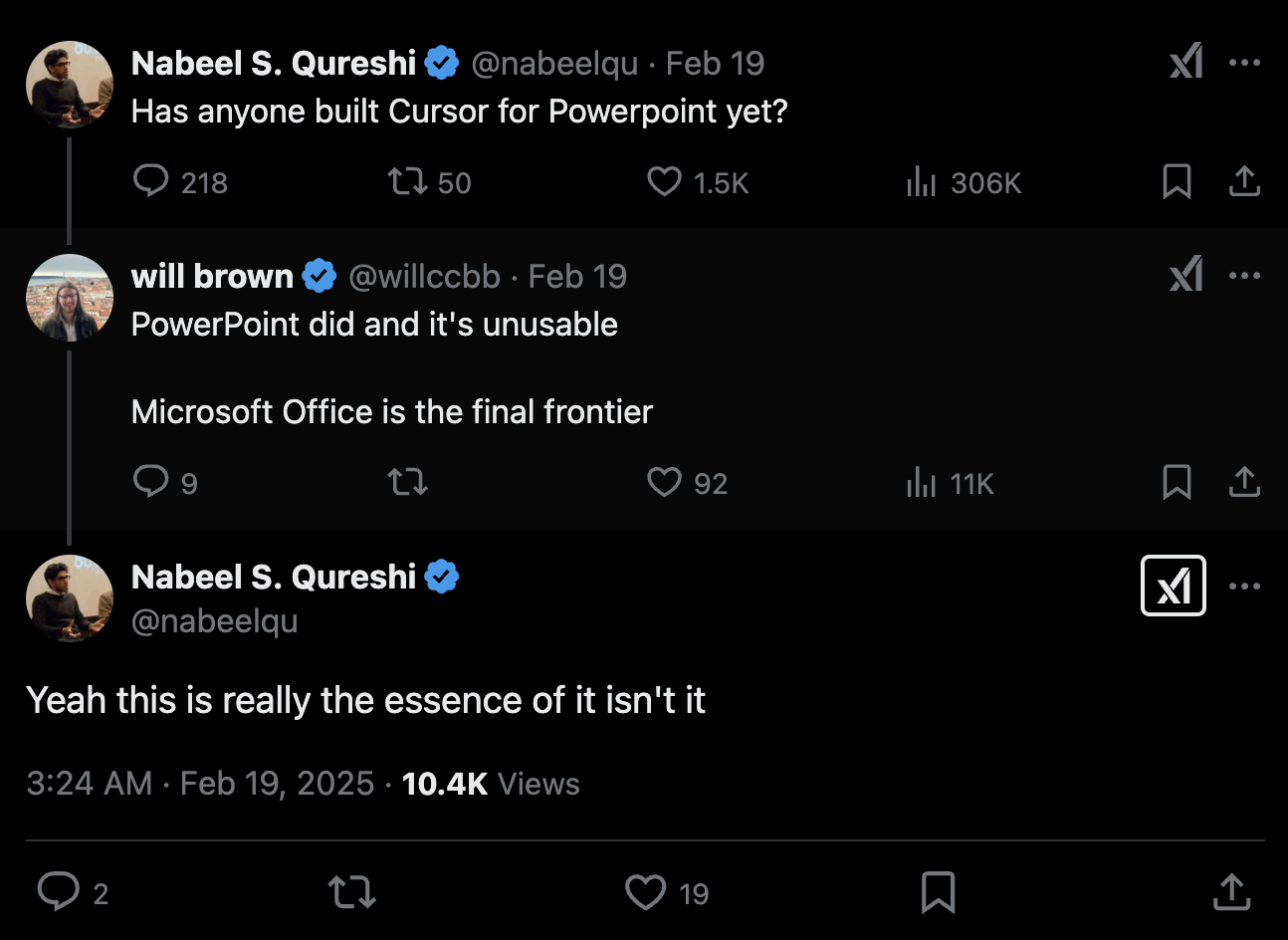This post had some discussions on Hacker News, see the thread.
Satya Nadella, shares his thinking on the future of knowledge work (link to YouTube for those who don’t want to read) on Dwarkesh Patel Podcast. He thinks that white collar work will become more like factory work, with AI agents used for end-to-end optimization.
Dwarkesh: Even when you have working agents, even when you have things that can do remote work for you, with all the compliance and with all the inherent bottlenecks, is that going to be a big bottleneck, or is that going to move past pretty fast?
Satya: It is going to be a real challenge because the real issue is change management or process change. Here’s an interesting thing: one of the analogies I use is, just imagine how a multinational corporation like us did forecasts pre-PC, and email, and spreadsheets. Faxes went around. Somebody then got those faxes and did an interoffice memo that then went around, and people entered numbers, and then ultimately a forecast came, maybe just in time for the next quarter.
Then somebody said, “Hey, I’m just going to take an Excel spreadsheet, put it in email, send it around. People will go edit it, and I’ll have a forecast.” So, the entire forecasting business process changed because the work artifact and the workflow changed.
That is what needs to happen with AI being introduced into knowledge work. In fact, when we think about all these agents, the fundamental thing is there’s a new work and workflow.
For example, even prepping for our podcast, I go to my copilot and I say, “Hey, I’m going to talk to Dwarkesh about our quantum announcement and this new model that we built for game generation. Give me a summary of all the stuff that I should read up on before going.” It knew the two Nature papers, it took that. I even said, “Hey, go give it to me in a podcast format.” And so, it even did a nice job of two of us chatting about it.
So that became—and in fact, then I shared it with my team. I took it and put it into Pages, which is our artifact, and then shared. So the new workflow for me is I think with AI and work with my colleagues.
That’s a fundamental change management of everyone who’s doing knowledge work, suddenly figuring out these new patterns of “How am I going to get my knowledge work done in new ways?” That is going to take time. It’s going to be something like in sales, and in finance, and supply chain.
For an incumbent, I think that this is going to be one of those things where—you know, let’s take one of the analogies I like to use is what manufacturers did with Lean. I love that because, in some sense, if you look at it, Lean became a methodology of how one could take an end-to-end process in manufacturing and become more efficient. It’s that continuous improvement, which is reduce waste and increase value.
That’s what’s going to come to knowledge. This is like Lean for knowledge work, in particular. And that’s going to be the hard work of management teams and individuals who are doing knowledge work, and that’s going to take its time.
Dwarkesh: Can I ask you just briefly about that analogy? One of the things Lean did is physically transform what a factory floor looks like. It revealed bottlenecks that people didn’t realize until you’re really paying attention to the processes and workflows.
You mentioned briefly what your own workflow—how your own workflow has changed as a result of AIs. I’m curious if we can add more color to what will it be like to run a big company when you have these AI agents that are getting smarter and smarter over time?
Satya: It’s interesting you ask that. I was thinking, for example, today if I look at it, we are very email heavy. I get in in the morning, and I’m like, man my inbox is full, and I’m responding, and so I can’t wait for some of these Copilot agents to automatically populate my drafts so that I can start reviewing and sending.
But I already have in Copilot at least ten agents, which I query them different things for different tasks. I feel like there’s a new inbox that’s going to get created, which is my millions of agents that I’m working with will have to invoke some exceptions to me, notifications to me, ask for instructions.
So at least what I’m thinking is that there’s a new scaffolding, which is the agent manager. It’s not just a chat interface. I need a smarter thing than a chat interface to manage all the agents and their dialogue.
That’s why I think of this Copilot, as the UI for AI, is a big, big deal. Each of us is going to have it. So basically, think of it as: there is knowledge work, and there’s a knowledge worker. The knowledge work may be done by many, many agents, but you still have a knowledge worker who is dealing with all the knowledge workers. And that, I think, is the interface that one has to build.
If you got confused for a second there like me, Lean here is not referring to the open source proof assistant but lean manufacturing.
Whereas it is nice to dream, the actual sentiment on Microsoft Copilot and AI integration in Microsoft Office is along the following lines:
I have written about this in a previous post:
There is going to be an AI-native “Microsoft Office”, and it will not be created by Microsoft. Copilot is not it, and Microsoft knows it. Boiling tar won’t turn it into sugar.
